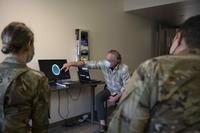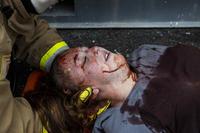Vision problems are common symptoms of traumatic brain injury (TBI). Sometimes, they can have a major impact on your quality of life. In fact, an estimated 60 percent of people with TBI have vision issues that may affect their professional and academic performance.
Car accidents, blunt force trauma and other possible traumatic events may lead to swelling in the brain. This can cause problems with vision or eye coordination. Visual problems after a TBI often affect eye coordination and can be difficult to diagnose, especially when there is no loss of clear vision or other outward sign of injury.
If you have any of these symptoms after a TBI, you may have a vision problem:
- Double vision
- Loss of vision
- Dizziness
- Vestibular (balance) issues
- Constant headaches
- Flashing lights and/or floaters in vision
- Increased sensitivity to light
- Difficulty reading (including difficulty processing and retaining information)
- Eye pain
- Injury or a foreign body on the surface of the eye (can be indicated by a scratching feeling under the eyelid)
- Visible injury of the eye or eyelid
- Difficulty performing any vision-based activity, including walking
Vision Treatment Following TBI
Katie Stout, director of clinical affairs for Defense and Veterans Brain Injury Center, said specialized treatment is available for TBI-related vision challenges.
"These conditions often require specialty evaluation and treatment," she said.
Specialty eye providers can prescribe corrective lenses, prisms, tints and rehabilitative therapy for TBI-related eye problems.
Dr. Felix Barker, an optometrist and associate director of research at the Defense Department Vision Center of Excellence, said appropriate specialty eye evaluation and care is a high priority when recovering from a TBI.
"Undiagnosed TBI visual coordination problems can affect near vision tasks such as reading, frustrating reintegration to normal work activities," Barker said. "These silent visual effects of TBI may be inaccurately attributed to PTSD and cognitive problems often seen with TBI. Specialty eye evaluation and care is essential."
If you recently experienced a TBI and notice problems with your vision, discuss the issue with your health care provider. Depending on the nature of the TBI and resulting vision symptoms, a health care provider may refer you to a specialist.










